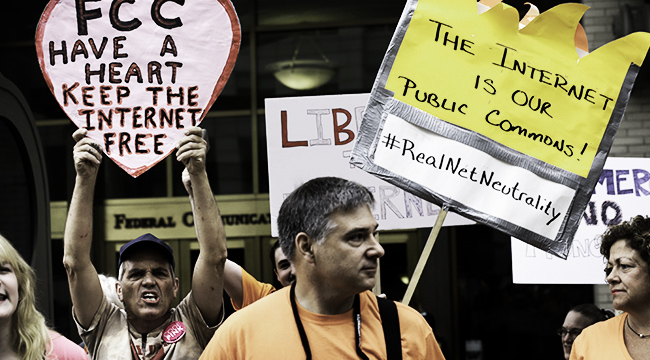
It’s all over the internet today, or, rather, not all over it. Net Neutrality Day has arrived again, with Reddit blanking out sections of its website, Twitter putting net neutrality as its top tag, and other major players — including Vimeo, Netflix, Mozilla, and Google — putting the issue front and center. But why is net neutrality so important, especially now? Because it’s under threat, when it really shouldn’t be.
What is net neutrality? At its simplest, the idea is that every site on the internet is treated the same way by internet service providers, or ISPs. No matter what site you visit, your ISP passes on the bits. Without net neutrality, your ISP can do whatever it wants, as technically they’re running a private platform. A Chrome extension you can try out has the worst case scenario, with annoying pop-ups trying to redirect you to “sponsored sites” and a refusal to load JavaScript. A world without net neutrality is a world where you can’t use Spotify, say, because it hasn’t paid protection money to your ISP.
This isn’t some abstract theory, either. Before the Obama-era FCC rules took effect, Netflix in particular found itself fighting the net neutrality war just to stay in business. The near-constant problems Netflix has had with ISPs show just how dirty some ISPs are willing to be.
You’d think the sheer popularity of net neutrality would protect it. John Oliver has covered the issue twice, and both time he managed to draw so much pro-net neutrality sentiment that he crashed the FCC’s comments site. And under the Obama administration, ISPs were classified as “common carriers,” which allowed the FCC to enforce net neutrality rules.
However, the FCC is now run by Ajit Pai, a net neutrality opponent and former employee of Verizon. Despite the fact that the public has overwhelmingly made it clear that they prefer net neutrality, repeatedly, Pai is ignoring that, to the point where an identity-stealing spambot posting the same comment over and over against net neutrality is being given the same weight and consideration as genuine comments from Americans who want net neutrality protected. Pai wants to replace the current rules with much weaker protections where the FCC will investigate complaints on a case-by-case basis, essentially trusting ISPs to keep their word.
So, what can you do to fight this? First, submit a comment to the FCC expressing support for net neutrality. Secondly, contact your Senators and Congressional representative, explaining your concerns about net neutrality. Third, tell your ISP that you want net neutrality. You are, after all, their customer, and the customer is always right. Fourth, spread the word: Share the news about net neutrality with your friends. A free and open internet is to everyone’s benefit, and everyone needs to pitch in to protect it.
